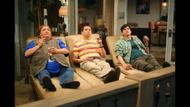Two and a Half Men was everywhere for a while. Hard to escape it. CBS had it on from 2003 until 2015, year after year. Charlie Sheen carried the role of Charlie Harper up to 2011. Then came Ashton Kutcher, filling in through the last four seasons. The swap kept the sitcom alive, sure, but it also split the story in two. A break you could feel. More than ten years later, Sheen is once again bringing up the idea of getting everyone back for a reunion.
There is something unfinished about the way it all ended. The show was still pulling audiences, still earning nominations, and then suddenly the central character was gone. A reunion brings up questions not just about nostalgia, but about how an ending can feel when it happens too fast.

Why Sheen says he wants it
In promotion for his documentary, aka Charlie Sheen, he spoke to Variety and explained why a reunion would matter to him. His words were clear:
"it would be wild and I would want to do it. I think it would be a gift to the fans… For me personally, it would also put a bookend on it to close that thing how it should have closed."
He put the focus on two things at once: the fans who supported the series and his own need to finish what he started.
How the exit shaped the show
Sheen left after a public conflict with Chuck Lorre and a lawsuit with Warner Bros. that was settled later in 2011. On screen, the writers decided to end Charlie Harper’s story at the start of season nine. It was not a gradual shift; it was sudden. That choice gave space for new characters but left eight years of build-up without a real conclusion. The moment continues to color how people remember the later seasons.

The original rhythm
What made Two and a Half Men stand out early was the triangle between Charlie, Alan, and Jake. The humor came from the clash of their different lifestyles, and it worked week after week. Many episodes played out like small domestic snapshots, simple but sharp. The balance changed after 2011. Kutcher brought a different energy, and while the show carried on, it was no longer the same combination that made the sitcom a hit in the first place.
Tensions behind the cameras
The problems were not only in the script. Jon Cryer and Sheen kept their distance for years, even if Cryer appeared later in Sheen’s documentary. Angus T. Jones, who grew up on the show as Jake, criticized it in 2012 and stepped away not long after. That created another break with the original trio. These pieces make any reunion complicated. Still, time has moved. Sheen recently appeared in Bookie, a comedy made by Chuck Lorre, which shows that at least some bridges have been rebuilt.

Success and recognition
At one point, the sitcom was everywhere, one of the biggest names on American TV. Two and a Half Men picked up 47 Primetime Emmy nominations along the way, and Sheen was in the mix four years straight, from 2006 to 2009, as lead actor in a comedy. The show even spilled into other series in 2008, it crossed paths with CSI, which says a lot about how present it was in pop culture back then. Those numbers and moments like that make it clear why people still bring the series up long after the final episode aired.
Chances of seeing a Two and a Half Men reunion happen
A reunion would face barriers. Charlie Harper’s death in the storyline cannot be ignored, Cryer and Sheen’s strained history would need to be addressed, and Jones has already chosen to step away. These facts make the idea complicated. At the same time, television has shown again and again that audiences welcome returns of familiar titles. Old sitcoms and dramas have come back in different formats. The renewed collaboration between Sheen and Lorre in Bookie adds another reason to believe the door is not fully closed.

A chapter left open
For now, there is no official word about a Two and a Half Men reunion. What exists is Sheen’s willingness to do it and his clear sense of why it matters. For viewers, the thought of one more round brings back memories of a show that shaped an entire period of network comedy. For the actor, it is the chance to close a book that was left open in 2011. Until something more concrete appears, the subject remains unresolved, and the sitcom continues to hold its place as one of the defining television hits of its time.
